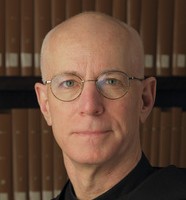
Columba Stewart, OSB
The Hill Museum & Manuscript Library (HMML) at Saint John’s University, Collegeville, Minnesota, was founded in 1965 to microfilm Benedictine libraries in Europe. The project grew rapidly beyond its monastic and European focus. In 2003, HMML began to use digital imaging technologies to document the manuscript heritage of ancient Christian communities in the Middle East. Starting in Lebanon, the project soon moved into Syria, Turkey, Iraq, the Old City of Jerusalem, and followed the historical progress of Mesopotamian Christianity as far as South India. HMML’s pioneering microfilming efforts in Ethiopia in the 1970s were resumed in a series of projects that included the Abba Garima Gospels, the oldest known Ethiopic manuscripts, and a first venture into Islamic manuscript digitization in Harar, an historic center of Ethiopian Islam. That step, followed by an invitation to work with the major Muslim family libraries of Jerusalem, prepared HMML to undertake leadership in digitizing the vast collections of Islamic manuscripts rescued from Timbuktu, Mali, in 2012, just before the famous desert city was occupied by Islamist forces. In addition to the project in Mali, HMML teams and partners are currently working in Croatia, Egypt, Iraq, Jerusalem, Lebanon, Malta, Ukraine, and Yemen.
In this presentation, Columba Stewart will explain how a Benedictine monastery in Minnesota became involved in such a massive effort to document cultural heritage; describe the challenges of data management and workflow; and present HMML’s online environment for manuscript studies, vHMML, which includes a Reading Room that will ultimately offer almost 100,000 complete digitized manuscripts to scholars around the world. HMML is now partnering with the Roshan Institute on projects to digitize, describe, and share Persian manuscripts endangered by conflict and environmental challenges.
See below for a Storify recap of this Digital Dialogue, including live tweets and select resources referenced by Stewart during his talk.
A graduate of Harvard, Yale and Oxford universities, Stewart has published extensively in his research field of early Christian monasticism. In 2009-10, he was the recipient of a year-long research fellowship from the National Endowment for the Humanities and a residential fellowship in Byzantine Studies at the Dumbarton Oaks Research Library in Washington, D.C. This year he is in Princeton at the Institute for Advanced Study and is also a Guggenheim Fellow.
Since 2003, Stewart has served as executive director of HMML, a global organization within Saint John’s University, Collegeville, Minnesota, that is the world’s leader in digital manuscript preservation. Stewart has developed HMML’s extensive manuscript digitization initiatives in historic Christian and Muslim communities in the Middle East, Eastern Europe, India and Africa. He has earned acceptance and trust from these communities, who know him both as a modern Benedictine monk and as a recognized expert on the history of early Christianity and monasticism.
Stewart is also a professor of theology at Saint John’s School of Theology and Seminary, teaching the history of monasticism.
A continuously updated schedule of talks is also available on the Digital Dialogues webpage.
Unable to attend the events in person? Archived podcasts can be found on the MITH website, and you can follow our Digital Dialogues Twitter account @digdialog as well as the Twitter hashtag #mithdd to keep up with live tweets from our sessions. Viewers can watch the live stream as well.
All talks free and open to the public. Attendees are welcome to bring their own lunches.
Contact: MITH (mith.umd.edu, mith@umd.edu, 301.405.8927).
